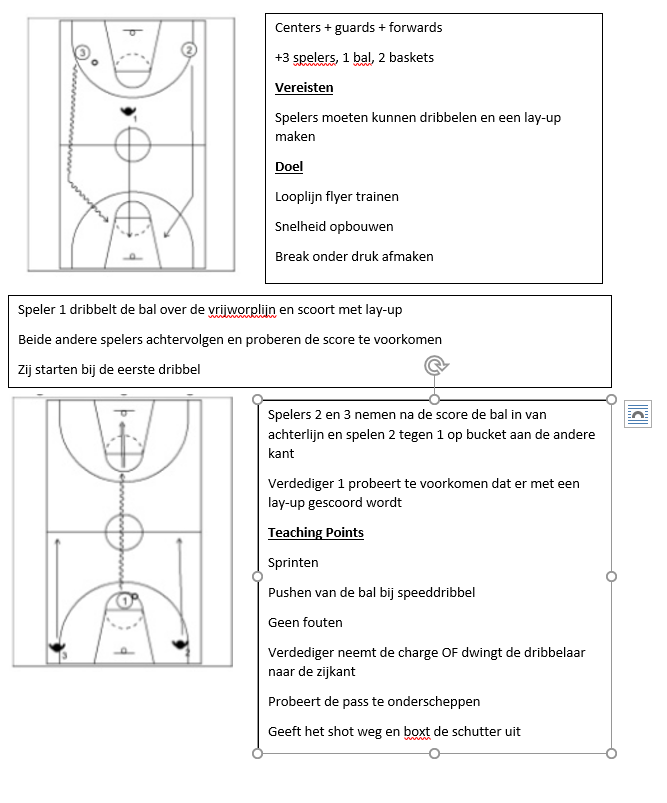Basketball drills
- Set up a course with running boards, bridges, hoops and cones and have the kids dribble down the course.
- You can make it as difficult as you like. The child who completes the course in the shortest time wins.
- The children stand in a large circle.
- There are several basketballs in the game.
- The children with the ball bounce the ball as fast as possible to a classmate or group member, while calling his or her name.
- This is recommended for children's camps (great outdoors!) or sports days, where children can learn each other's names and learn to catch the ball.
- Players who do not bounce the ball well, do not catch the ball or call out the wrong name, step out of the circle and do not participate for a while.
- As fewer and fewer players remain, the remaining players bounce more and more balls.
- Continue, until only one or two players remain.
- They have won.
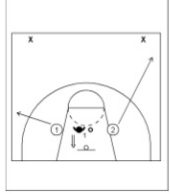
- Centers + Guards + Forwards
- 3 Players
- 1 ball
- -a basket
- -2 Cones
Requirements :
Players must be able to dribble and run a layup
Goal :
- To finish off an overtime situation in 2-man break.
- train outlet pass
- to train running line flyer
Organization:
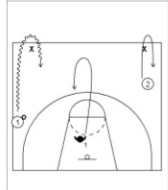
- the defender throws the ball against the board, left or right of the ring
- the attacker on the side of the board takes the outlet position and asks for the ball.
- The flyer sprints away towards the middle line.
- Flyer sprints around the pawn back to the basket.
- outlet dribbles as fast as possible around the other pawn
- the passer sprints to the centre circle, but has 1 foot in there and then goes to defend.
- attackers have 1 goal attempt and max 2 passes.
- the attacker who misses becomes the defender.
Teaching points
- the defender NOT to make any unsportsmanlike mistakes
- defender takes the charge or forces the dribbler to the side of the pitch
Warm-up
- dribble over and over again right hand
- dribble over and left hand again
- low dribble over and right again
- low dribble over and to the left
- high dribble over and right again
- high dribble over and left again
- protection dribble with a hand change every 2 or 3 dribbles (2 times over and over)
- quick dribble over and over again with crossover at the free throw centre and free throw line.
Requirements:
players must be able to run a lay up from a bounce pass
Goal: learn
how to punish the overplaying of the forward by an aggressive defense
Organization:
- guard dribbles up from behind the centre circle
- at the same moment the centre 4 comes to the elbow
- and player 3 sprints to the pawn
- 1 passes to 4 with a bounce pass
- 3 sprints to the basket with a sharp change of direction and speed
- and receives the bounce pass from 4
Rotation:
- 4 grabs the rebound
- and takes the ball on the back line
- 3 goes to defend the inbound pass
- when 9 receives the ball, 7 takes position at the sideline for the next inbound pass
- 4 and 5 do not rotate but take turns.
- 1 joins the line behind the pawn
- 9 passes the ball to 8 and joins the row behind it
Variation:
- 1 pretends he is going to put a screen away on the weak side, but cuts to 4 for a hand off
- takes the shot
- OR plays pick and roll with 4
Teaching Points:
- Sprint to the pawn: when passing, you as the attacker must take the defender well outside the three-point line to make enough space for the backdoor.
- 1 has to feint immediately after the pass to be in time for the hand off.
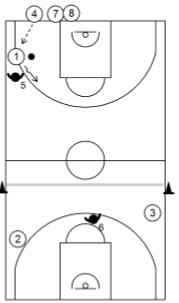
Prerequisites:
players on the dribble can defend Â- and can make a pass the length of the field
Objective:
to practice defending the backfield in the arrowpress Â- to anticipate the pass and always make sure you are in a position to intercept it
Organisation:
- 4 takes the ball and then does not take part in the game anymore, but counts down the seconds
- defender 5 applies maximum pressure on the dribbler
- the defenders can defend all over the field
- attacker 1 may only act on the defensive half Â- attackers 2 and 3 only on the offensive half
- after a stop or score, defender 5 takes the ball back for the next round
- if the attackers score within 10 seconds they have a point Â- if not, it is a point for the defenders Â- the attacker calls if there is a foul on him. Point for the attack.
- play 5 times in a row with the same defenders
- 3 new attackers each time.
- If the defenders make less than 2 stops, they must run.
- when there are 2 or more stops, all attackers must run.
Teaching points:
defend the dribbler on your feet - he may not pass you under any circumstances Â- arms wide to make a pass difficult Â- defender 6 must anticipate the long pass to intercept it Â- must position himself so that he can see the ball AND both other attackers as much as possible (split vision) Â- always adjust his position on the field to intercept the most likely pass Â- if he has not been able to intercept the long pass, Â- He must NOT allow a lay up Â- Defender 5 must then sprint full speed towards the free attacker on the weak side.
Variations:
In the beginning, you may have to limit the space for attackers 2 and 3. Use existing lines on the floor, or place pawns on the sidelines on the attacking half.
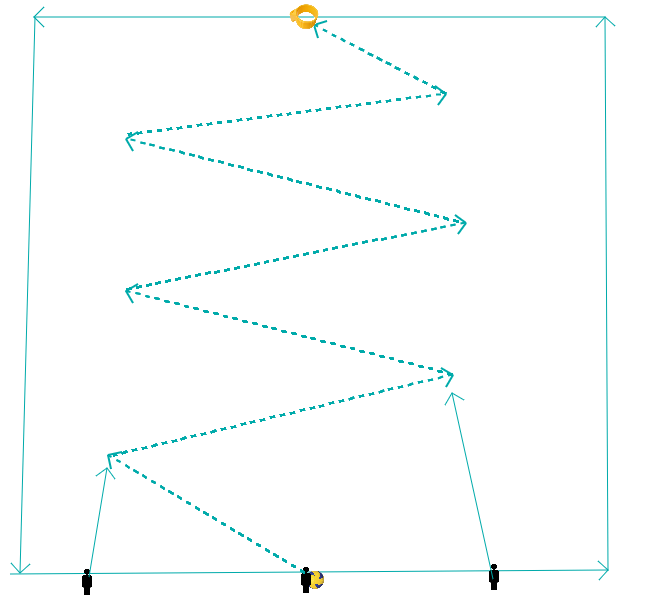
With 3 men on the back line and the middle one has the ball- The middle passes to a man and runs after the ball
- The man in the middle passes to the man on the other side, who also runs after the ball.
- They do this while running to the basket on the other side.
- When someone is close enough to the basket, the man runs a lay-up.
- He becomes the defender and the other two attackers must try to reach each other with a long ball.
- The goal of the defender is to prevent the attackers from scoring.
- If the attackers do not manage to score, they must do 5 push-ups.
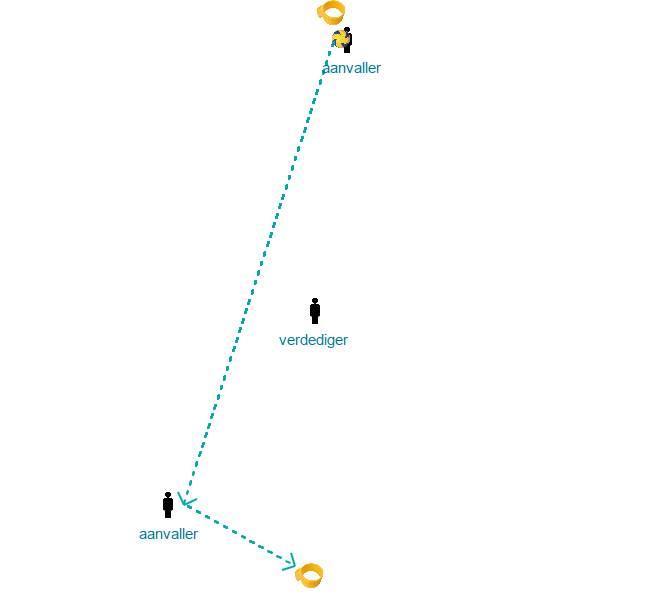
- 4 pawns with ribbons (positioned low to the ground)
- 1 basketball per person
1. The player jumps over the ribbon with 2 feet at the same time, while holding the basketball in front of him at chest height.
2. The player jumps backwards back to the middle.
3. In the middle, the player makes a jump bringing the basketball up (arms extended) and the player makes a 180 C turn.
4. The exercise repeats facing the other side.
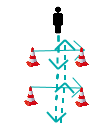

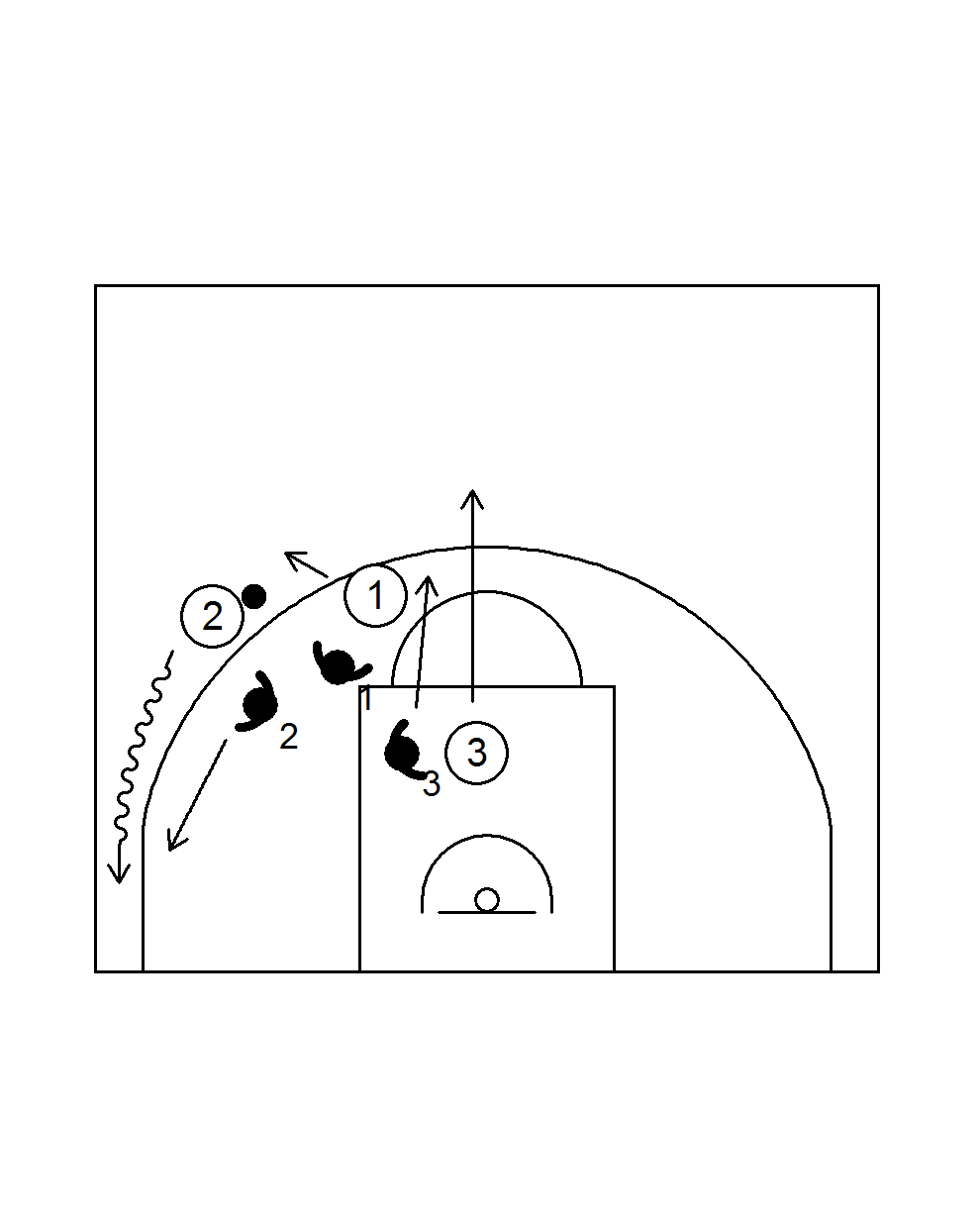
Goal: to defend one pass away
Organization:
- attackers use quarter of the field
- try to get free with in-out or cut
- first restore balance by occupying the 3 positions before cutting again
- defender overplays when his man is playable with one pass
- attacker can dribble
- a waiting player counts down 20 seconds
Teaching Points:
- hand in the passing line
- front foot in the passing line
- catch your man with your forearm
- 3/4 of your attention on the man, 1/4 on the ball
- NO help
- change after x stops
Form of play:
- each team gets 5x ball possession
- who makes the most stops
Goal:
- shot from the elbow
- outlet pass after score
- overhead pass from low post to elbow
Organization:
- after shot rebound and immediately step over the back line and take the ball
- always chase your ball and take the next position
- set a goal; e.g. 30 shots.
Teaching Points:
- in the last step bring the ball above your head and turn your face towards the pitch
- Tight overhead pass to the outlet
- ask high for the ball
- Pass the ball in the shot hand
Variations:
- counterclockwise and clockwise
- Fill up waiting time at the forward position with fake passes
- The other way round: after scoring, pass to the elbow and shoot from the corner

Prerequisites:
players on the dribble can defend Â- and can make a pass the length of the field
Objective:
to practice defending the backfield in the arrowpress Â- to anticipate the pass and always make sure you are in a position to intercept it
Organisation:
- 4 takes the ball and then does not take part in the game anymore, but counts down the seconds
- defender 5 applies maximum pressure on the dribbler
- the defenders can defend all over the field
- attacker 1 may only act on the defensive half Â- attackers 2 and 3 only on the offensive half
- after a stop or score, defender 5 takes the ball back for the next round
- if the attackers score within 10 seconds they have a point Â- if not, it is a point for the defenders Â- the attacker calls if there is a foul on him. Point for the attack.
- play 5 times in a row with the same defenders
- 3 new attackers each time.
- If the defenders make less than 2 stops, they must run.
- when there are 2 or more stops, all attackers must run.
Teaching points:
defend the dribbler on your feet - he may not pass you under any circumstances Â- arms wide to make a pass difficult Â- defender 6 must anticipate the long pass to intercept it Â- must position himself so that he can see the ball AND both other attackers as much as possible (split vision) Â- always adjust his position on the field to intercept the most likely pass Â- if he has not been able to intercept the long pass, Â- He must NOT allow a lay up Â- Defender 5 must then sprint full speed towards the free attacker on the weak side.
Variations:
In the beginning, you may have to limit the space for attackers 2 and 3. Use existing lines on the floor, or place pawns on the sidelines on the attacking half.








